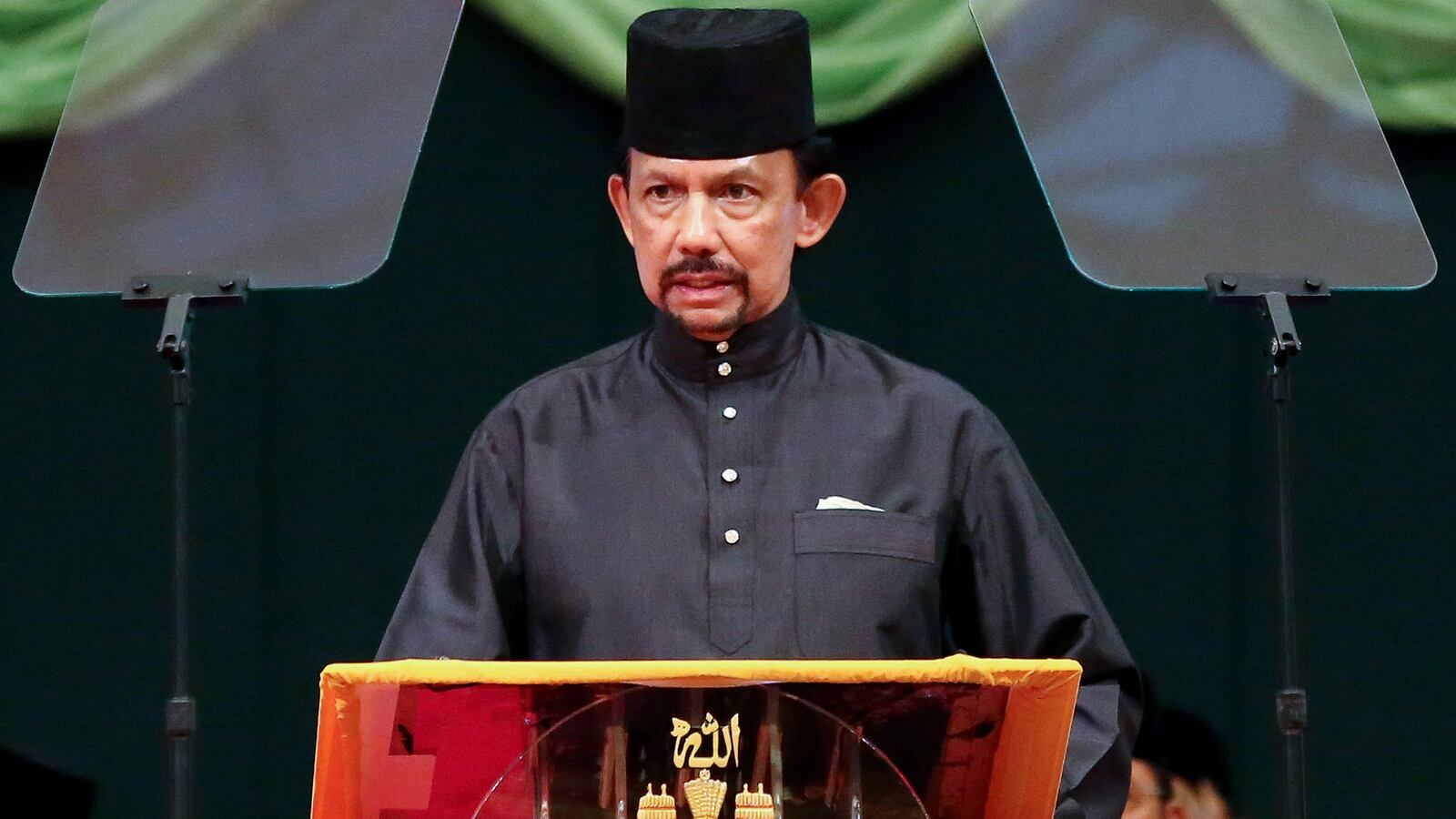Remember when we all thought historical events would push us toward greater rationality, moderation, and liberalism?

Well, on Tuesday, April 22, the tiny sultanate of Brunei planned to put into effect a new penal code that provides “stoning to death” as the penalty for rape, adultery, sodomy, extramarital sexual relations (for Muslims), defamation of the Prophet Mohammed, insulting any verses of the Koran and Hadith, blasphemy, and declaring oneself a prophet or non-Muslim.
Oh, and robbery and murder. (Late Monday night Brunei delayed the implementation of the code, but an official said the punishments would begin “in the very near future.”)
To this outrageous return to medieval modes of justice, the response in this country has been…the cancellation of a conference at the Beverly Hills Hotel.
Yes, it seems the famed Los Angeles landmark is owned by the Sultan of Brunei, Hassanal Bolkiah (or at least, by a development group he controls). Coincidentally, the OutGiving conference—the largest single event for LGBT donors worldwide—was scheduled to take place there May 1-4. After the Washington Blade notified one of the conference organizers of the Sultan’s not-so-kind-and-gentle approach to homosexuality, the conference was relocated.
Other than that—nothing. On the contrary, Secretary of State John Kerry visited Brunei twice last year, speaking glowingly of the “Abode of Peace” (the meaning of Brunei’s full name, Brunei Darussalam). Just two weeks later, the Sultan issued his decree that shariah, Islamic law, would be the new law of the land.
This has left the United Nations Human Rights office as the only major international forum objecting to, or even taking notice of, this horrifying new development. Rupert Colville, spokesperson for the Office of the UN High Commissioner for Human Rights (OHCHR), noted that “under international law, stoning people to death constitutes torture or other cruel, inhuman or degrading treatment or punishment and is thus clearly prohibited.”
But it’s not international law that the Sultan of Brunei is interested in—it’s Islamic law. The institution of shariah is meant to celebrate Brunei’s 30th year of independence—the country was a British protectorate in the 19th century, and except for World War II, remained under British control until 1984—and to represent “part of the great history of our nation.” Appropriately enough, Brunei sent a delegation to Saudi Arabia, to see how they implemented shariah there.
Geopolitically, the move is likely yet another step for the relatively conservative Brunei to define itself against its more liberal (by comparison) neighbors, Indonesia and Malaysia. The Sultan of Brunei will not have a quasi-Islamist rebellion within the Abode of Peace. He will stay ahead of the conservative curve.
What will be the effects of this change? It’s too soon to say. Perhaps it is merely ceremonial in nature. Brunei has had the death penalty for decades, yet its last execution took place in 1957, under British rule. Maybe the penalties called for by shariah will be similar—although the Saudi Arabia trip suggests otherwise.
At the very least, Brunei’s government has indicated that some laws will, indeed, be enforced. The wearing of indecent clothing, for example, will get you six months in jail, as will any act that, according to the new penal code, “tarnishes the image of Islam, corrupts moral standards, causes negative influence or upsets eyewitnesses.”
However, a “senior legal officer of the Islamic Legal Unit at the Ministry of Religious Affairs” told the Brunei Times that authorities will enforce the law gradually. “If the person is wearing clothing that is too offensive or revealing, then the enforcement agencies should take action or at least advise the offender,” the official said. “But we will implement this provision with wisdom, so people won’t be shocked and angered.”
Certainly, for the 23 percent of Brunei’s 415,000 citizens who are not Muslim, the new code represents a major affront to religious liberty. Anyone who drinks liquor in a public place, Muslim or non-Muslim, will be liable to two years’ imprisonment and a fine of $8,000.
Moreover, Saudi Arabia and Iran have notoriously carried out even the more grisly penalties of shariah. Theft, for example, is punishable by amputating the right hand. Mocking the Koran? Forty strokes of the cane.
Despite all of this, America’s conservative defenders of religious liberty have been oddly silent on this issue, even though Brunei is 10 percent Christian—and the imposition of shariah law is usually something that gets conservatives’ danders up. Presumably, they are too busy worrying about whether bakers in Colorado have to bake penis cakes.
If one were a cynic, one might wonder whether the Right’s silence on this unprecedented imposition of Islamic law against Christians has something to do with Brunei’s wealth and petroleum resources; the country is smaller than Delaware, but is the ninth-largest producer of liquefied natural gas in the world. It’s also quite a wealthy place—Forbes estimates it’s the fifth-richest nation, per capita. So, as with Saudi Arabia, there might be some compelling interests behind the silence.
Of course, the silence extends to the Left as well. Other than the UNHCR, few liberals seem to have even noticed the change. It’s been covered in gay newspapers—often characterized, misleadingly, as a crackdown on homosexuality—but not by the mainstream press. Amnesty International put out a press release calling for revocation of the law. But that’s about it.
So, barring some unforeseen global wake-up call on the re-imposition of death by stoning, it seems that the shariah will be extended to Brunei’s 40,000 Christians, 50,000 Buddhists, and 325,000 Muslims as well. The arc of history may bend toward justice, but there are some pretty serious kinks along the way.






